Gotta collect ‘em all: Pokemon, sports trading card boom spreads to Singapore
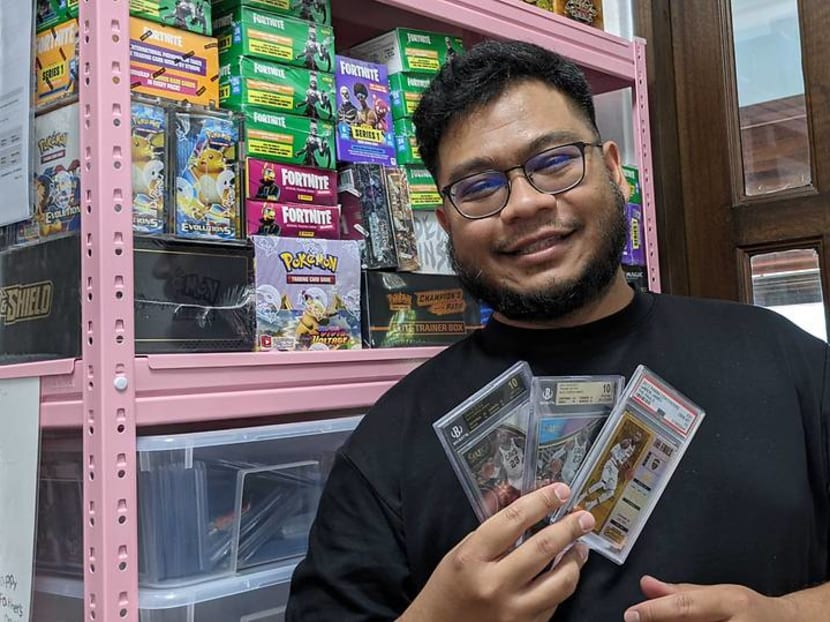
Fariheen Faroukh, the owner of online trading card business Heenja's Cards. (Photo: Zhaki Abdullah)
SINGAPORE: For Fariheen Faroukh, his love affair with trading cards began when he was a teenager.
“My school was pretty near Serene Centre, where there used to be comics shops and card shops,” recalled the 38-year-old.
“So one of my favourite things to do after school was to go and head over to the comic shop to buy comics or read comics, and eventually this kind of grew into buying cards,” he said.
This included basketball cards as well as those from trading card games such as Pokemon and Magic: The Gathering, said Mr Fariheen.
His interest in collectible cards waned over the years until about 10 years ago when he discovered football cards from publisher Futera, which combined the collectibles with an online game experience.
He then came across a card autographed by former Chelsea midfielder Frank Lampard, which he was able to sell on eBay for “a few hundred dollars”.
“I kind of started really getting back into it,” he said.
Despite that initial sale, Mr Fariheen - then a sales director - remained largely a collector until 2019, when he decided to take a sabbatical from work and turned to selling cards from his collection to make money.
This coincided with an increased interest in the cards worldwide, which was further heightened by global lockdowns amid the COVID-19 pandemic.
This spurred him into becoming more serious about selling cards, describing it as a “very exciting” business opportunity.
READ: Gotta catch 'em all: Pandemic sends prices soaring for Pokemon cards
“I just went into it while looking for a new role after my sabbatical. But eventually, I found that I didn't really need to get into a new role and I thought I might as well do this full time.”
Mr Fariheen now runs Heenja’s Cards, selling cards online from his home in Hougang.
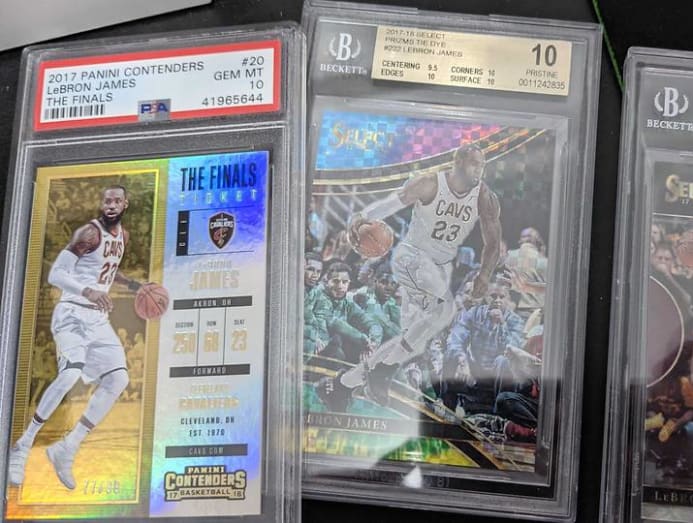
In between taking his three children to school and classes, as well as supervising their homework, he checks his eBay store for sales, mailing out cards to customers as well as checking out new cards to buy which might have the potential to increase in value.
More than a thousand cards - ranging from football to Pokemon ones - are listed in the store, with prices ranging from US$9 (S$12) for a card of English footballer Ben Watson to more than US$100,000 for an autographed card of basketball star Michael Jordan.
About a third of Heenja’s Cards' listings are for four-time NBA championship winner Lebron James.
“I kind of like what Lebron represents, culturally and socially, and also how amazing a player he is,” said Mr Fariheen.
“It’s not just about the money, you have to be able to enjoy collecting a player.”
READ: The cash-flush amateurs hunting game cards, handbags and art
TRADING CARD BOOM
The prices of collectible trading cards have skyrocketed globally over the past year, with an autographed rookie card for NBA star Luka Doncic selling for US$4.6 million last month.
This made the card featuring the 22-year-old Dallas Mavericks point guard the most expensive basketball card, according to a report by sports betting media outfit Action Network.
In January, a 1952 card for the late baseball player Mickey Mantle set the record for the most expensive sports card sold, at US$5.2 million.
The worldwide hype is not limited to sports cards.
Late last year, boxes of 1999 trading cards for video game franchise Pokemon were reported to have been auctioned off for around US$400,000 (S$528,000) each.
eBay sees an average of 119 trading cards listed each minute, with almost 45 million trading cards sold on the site last year alone.
According to the online marketplace, sales for basketball and Pokemon cards in the United States increased 373 per cent and 574 per cent respectively.
READ: Ebay earnings beat on pandemic-driven surge in online shopping; shares soar
The boom has been driven in part by the COVID-19 pandemic, as movement restrictions prompted people to look for ways to spend or make money online, said Mr Fariheen.
He also pointed to the influence of well-known investors who have been bullish on trading cards, such as billionaire Mark Cuban and entrepreneur Gary Vaynerchuk, who said in a 2019 blog post that sports cards would make a "great alternative investment" over the next few years.
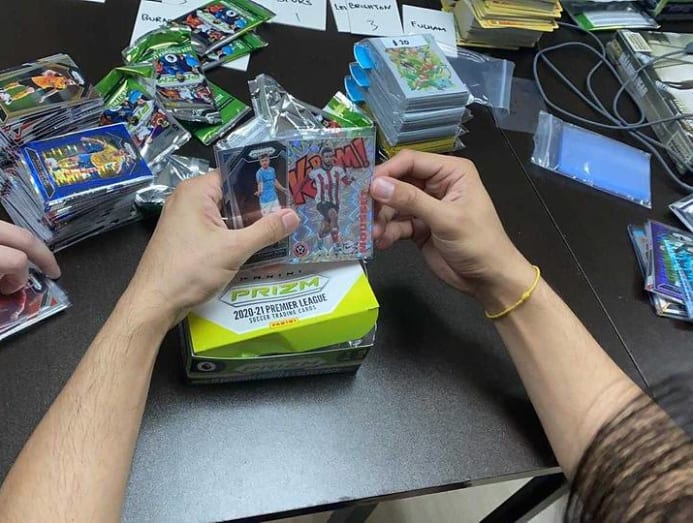
For Pokemon - which is celebrating its 25th anniversary this year - one factor driving the demand is childhood nostalgia, said Mr Fariheen.
Children who played the Pokemon games or watched the cartoons are now adults with disposable income to spend on their hobbies, he noted.
“People are happy to buy into their childhood, buy into the nostalgia about what they had when they were growing up,” he said.
Options such as fractional buying - where collectors are able to buy a small ownership share in trading cards and other memorabilia - have also made investing in such collectibles more affordable and thus more attractive, he added.
Sports collectibles have also jumped on the non-fungible tokens (NFT) bandwagon. There are trackable digital collectibles such as those offered by Canadian firm Dapper Labs, which sells short video clips of basketball players under the NBA Top Shot brand.
Mr Fariheen said he expects the interest in digital memorabilia to grow, although he expects many will still want to hold on to physical cards.
"I think people do want something they can touch, or have in their possession," he said.
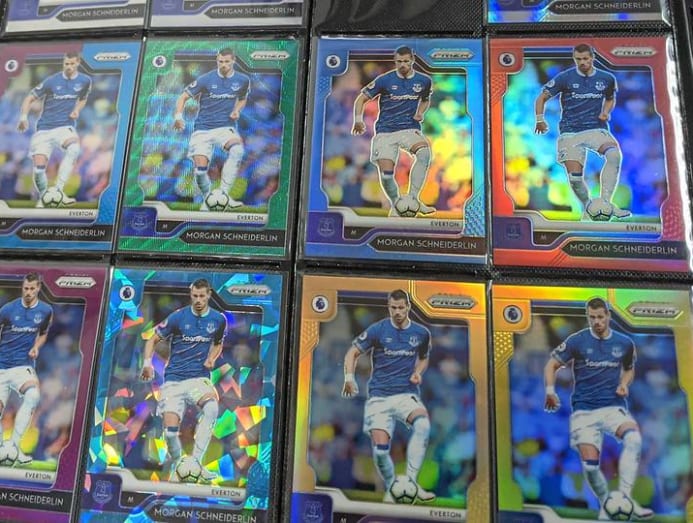
The collectible card craze has been further spurred by celebrities, noted entrepreneur Mark Tan. These personalities include athletes and influencers such as YouTuber Logan Paul, who started opening packs of collectible cards in online videos and is known for sharing his fondness for Pokemon.
Mr Tan, 30, started selling cards as a polytechnic student to “make a couple of dollars here and there”.
“And then I realised, hey, I’m actually pretty good at this … so I converted it into a career,” he told CNA.
“Mum didn’t really like it, but after a while, she saw I was really passionate about what I do."
Mr Tan started trading card retailer Grey Ogre Games with friends in his early 20s before moving to Germany to act as a buyer for a store focusing on collectible card game Magic: The Gathering.
He travelled constantly, he said, getting cards appraised or transporting large orders from country to country, although the COVID-19 outbreak put a stop to this. Mr Tan said the business is now trying to adapt to operating under pandemic conditions.
His work affords him a lot of downtime, he said, allowing him to run 1 of 1 Collectibles, a store in Geylang selling trading card games as well as selling football cards online.
“We were losing money for like the first two years, first two-and-a-half years of the business, but we were just doing it because it’s our passion,” he said.
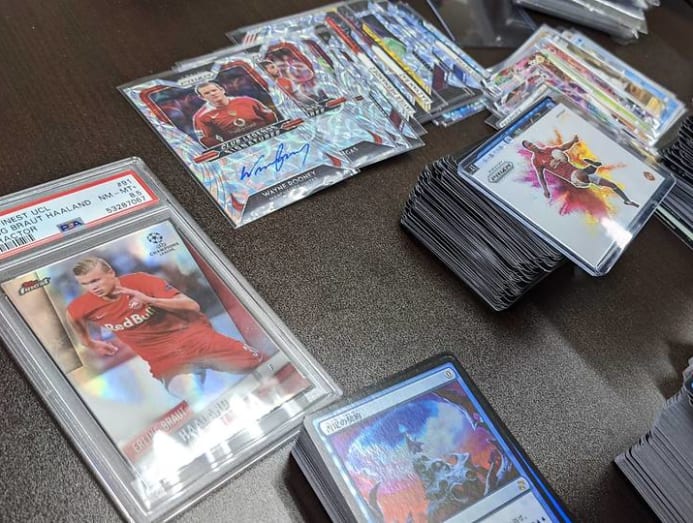
Mr Tan describes identifying up-and-coming footballers and buying their cards as akin to being a talent scout, singling out Norwegian footballer Erling Haaland as a viable “prospect” whose cards are likely to go up in value.
A limited-edition card of the 20-year-old striker for Bundesliga side Borussia Dortmund sold for US$124,230 earlier this month.
Sales of football cards on eBay jumped a whopping 1,586 per cent last year, according to figures provided by the online auction site.
Despite the sport’s popularity in Singapore, collecting football cards has yet to take off here, Mr Tan noted, estimating that the number of serious football card collectors is in the low hundreds.
“People don’t know the value of their soccer knowledge when it comes to collecting soccer cards,” he said.
Mr Tan said there is a larger local market for Pokemon cards, pointing to the queues at the franchise’s store at Jewel Changi Airport and estimating that there may be about 50,000 Pokemon collectors in Singapore.
He said that those who were children when the cards first came out have now passed on their love of Pokemon to their children.
“I don’t see the Pokemon train slowing down,” he said.
READ: IN FOCUS: Foot Locker crowds offer glimpse into cut-throat world of reselling sneakers
HARD WORK
Despite the current boom, Mr Fariheen admits he has had his doubts about whether cards will continue to be popular.
“When you begin by collecting and not really selling, and then you go into it full time, you always wonder - how sustainable is this as a full-time career?” he said.
Still, he believes that the market for collectible cards has always been there, with buyers now seeing it as an investment on the same level as purchasing artworks.
“There will always be doubts, but I think I've seen enough interest in the market, even during the economic downturn, to see potential for the long-term," he added.
Dr Ben Charoenwong, assistant professor of finance at the National University of Singapore Business School, described the high price of cards as a "self-fulfilling prophecy". He noted that their prices are "only as good as what people expect future prices to be".
Prices may collapse should people's expectations reverse, he said, suggesting that this could happen should there be a negative announcement about a trading card manufacturer, for example.
"But typically, some discrete piece of news, perhaps even as minor as someone selling a rare card at a loss, gets realised, then people suddenly change their behaviour and valuations collapse," said Asst Prof Charoenwong.
Prospective investors should ask themselves if they would be willing to buy the cards even if they were unable to sell them, he said.
"The average person who does not attach any personal happiness to owning the collectible itself should probably avoid participating in the market, for fear that future expected prices can suddenly collapse."
While there may be people looking to cash in amid the current hype, making money off cards is hard work, warned Mr Tan, adding he spends up to five hours a day researching what cards might become valuable.
"It takes research. A lot of my customers come and ask me for advice, like what do I invest in?" he said.
"I always tell them, I have these things that I'm buying because I think they are underpriced, but they're not all winners. Yes, there are winners once in a while, but they're not all winners," he noted, adding buyers should have a genuine appreciation of the cards.
"Sometimes there are losers. Buy the things that you enjoy."








